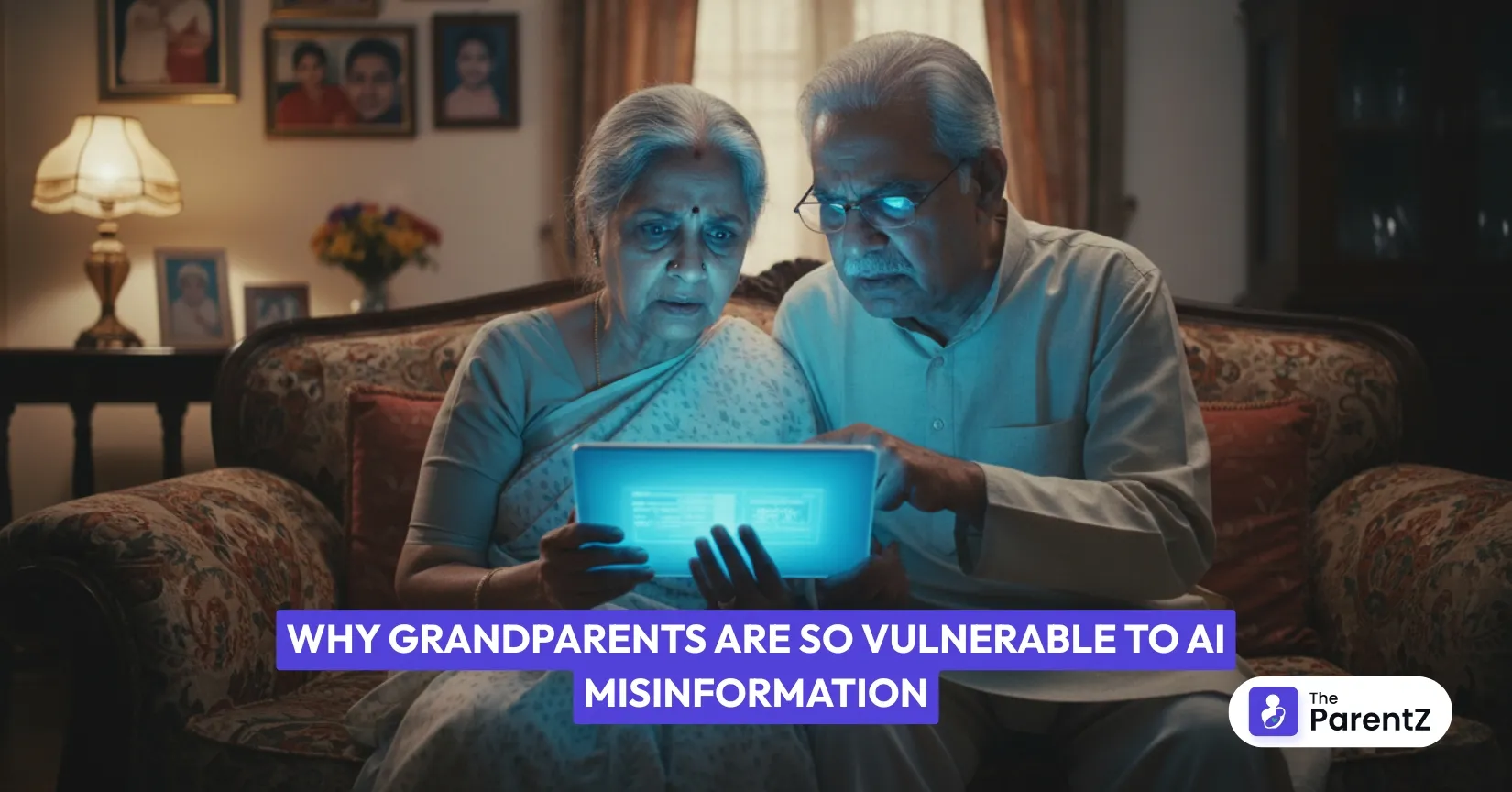Your mother is excitedly telling your kids about a new “miracle cure” she watched on YouTube Shorts, or your father forwards a shocking WhatsApp video claiming AI robots will soon replace school teachers. To them, it feels real, urgent, even helpful. But to you, it sounds odd and concerning. This is the daily struggle many families face today: grandparents getting caught in the web of AI-driven misinformation.
These days, many grandparents are being introduced to AI through the platforms they trust most: YouTube videos, short reels, forwarded WhatsApp messages, and even online news clips. The problem is, they didn’t grow up learning how to question or verify online information. When something looks polished or has a convincing voiceover, they take it at face value.
So, why exactly are grandparents so vulnerable to AI misinformation? And how does it impact us as families, especially the kids they interact with? Let’s break it down.
How Grandparents Meet AI Every Day
For many grandparents, AI doesn’t mean advanced algorithms. It comes into their lives through:
- YouTube Shorts and Reels: Short, catchy videos on food, health, spirituality, or shocking news.
- WhatsApp Forwards: “Breaking news” videos or AI-edited images from friends’ groups they trust.
- Facebook Feeds: Memes, AI-generated photos, and videos that look like documentaries.
- TV and Online News: Even news clips sometimes use AI-edited visuals that aren’t clearly labeled.
For them, these platforms are sources of entertainment, bonding with other grandparents and family, or gaining new knowledge. However, what they often overlook is how easy it has become to create fake “news” with AI tools that appear and sound incredibly realistic.
Why They Believe So Easily
Grandparents are not naive. They have lived through decades of real-world wisdom. But the digital age comes with its own challenges:
- Trust in authority: They often think, “If it’s on a screen, it must be true.”
- Lack of digital training: They didn’t grow up with fact-checking habits like today’s young people.
- Emotional pull: AI misinformation often tugs at values close to their heart; family health, safety, morality, or money-saving tips.
- Peer pressure: When others in their WhatsApp group also forward the same thing, it feels validated.
This makes them prime targets for misinformation, whether it’s about politics, medicine, or new AI dangers.
The Ripple Effect on Kids
It’s not just grandparents who suffer. Many times, they share these AI-influenced stories with their grandchildren. Imagine a 10-year-old hearing from their grandfather that “AI robots can hack your mind” or that “a herb can cure all diseases.” Kids look up to grandparents, so they may absorb these beliefs without questioning them.
In homes where grandparents spend a lot of time with children, their daily knowledge-sharing shapes kids’ early ideas of the world. And if misinformation goes unchecked, it can confuse kids or even make them scared of technology instead of seeing its good side.
How Parents Can Step In
Parents play the bridge between tech and tradition. But it needs patience. Shutting down grandparents with “Don’t believe everything!” often hurts them, because they feel dismissed. Instead, try:
- Explain gently: “Papa, this video was made with AI. Anyone can make a video look official nowadays. Let’s check if it’s on a real news channel.”
- Show examples: Share small instances of AI deepfakes or fake news to build awareness.
- Create safe spaces: Teach them which sources to trust (reliable news, fact-checking services).
- Involve them in learning: Watch a real news report together and compare it with a fake forward.
The goal is to guide, not criticize. Remember, they’re trying to keep up in a world that suddenly became digital.
Kids Can Play a Role Too
Kids are excellent “digital buddies” for grandparents. Children today are natural with gadgets and online content. They can:
- Teach grandparents how to double-check information online.
- Show them how to use Google search or fact-checking tools.
- Laugh off the silly fake AI reels together so grandparents see it’s not scary.
- Encourage open conversations: “Dadu, I saw this too. It’s fake. Want me to show you why?”
When kids help out, grandparents feel less judged and more supported. It turns into family teamwork rather than a lecture.
Conclusion
Grandparents are curious, caring, and eager to stay connected with the world. But in doing so, they’re walking into an era dominated by AI-generated stories that are hard to separate from the truth. With parents offering patient guidance and kids stepping in as friendly tech coaches, families can protect grandparents from being misled.





Be the first one to comment on this story.